2025's Best Pool Heaters: Your Key to All-Season Swimming Comfort
November 17th, 2024
November 17th, 2024
In the midst of a chilly breeze, the dream of a year-round pool escape beckons. For those who cherish a dip regardless of the season, a reliable pool heater is indispensable. As 2024 unfurls its technological advancements, the prospect of buying the best pool heater can both excite and overwhelm. Selecting the right one involves more than just settling on a brand or model; it's about embracing a blend of efficiency, sustainability, and cost-effectiveness tailored to your unique needs.
Last summer, a friend of mine decided it was time to upgrade. After days of research, he realized that the options were vast and varied. He had to consider variables like the size of his pool, the local climate, and energy efficiency ratings. His journey taught me that purchasing a pool heater isn't just about immediate warmth but also about long-term savings and environmental impact.
In recent years, technology has advanced significantly, introducing heaters that promise to be more energy-efficient and user-friendly. From solar-powered models to traditional gas heaters, each option comes with its own set of advantages and caveats. Navigating these choices requires a balance of knowledge and intuition. Whether you're a first-time buyer or looking to replace an old unit, understanding the nuances of what's available will ensure those poolside moments are as enjoyable as they are warm.
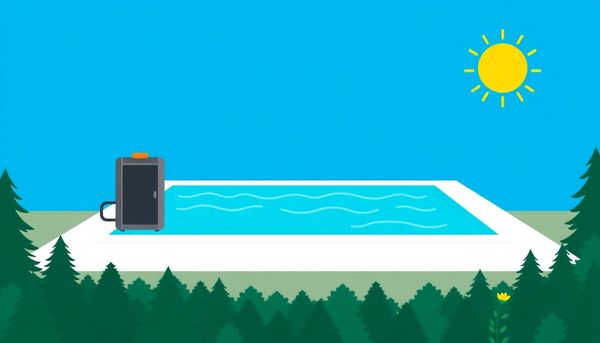
Finding the right pool heater for your aquatic haven can feel like navigating uncharted waters, but with the right information, you’ll soon be swimming comfortably, even when the weather isn’t playing nice. Start by considering your climate and pool usage. Do you live where the sun shines warmly most of the year, or are chilly breezes a regular guest? If you enjoy year-round dips, a robust gas heater might be your best ally, warming your pool quickly and efficiently even in cooler temperatures.
Solar heaters are an eco-friendly option, harnessing the sun's rays to warm your water. They’re perfect for sun-kissed regions and those looking to minimize their carbon footprint. Just make sure your roof or backyard has enough space for the solar panels. Alternatively, if you seek a balance between efficiency and environmental impact, an electric heat pump might be the answer. These pumps draw heat from the air, making them a cost-effective choice in milder climates where winter frosts are less common.
Remember, your pool size drastically influences your heater choice. Larger pools will demand higher BTU (British Thermal Unit) output to maintain that cozy temperature. Additionally, consider installation and operating costs—not just the initial investment. Think of your pool heater as a steadfast companion, one that requires a bit of thought and care to select, but will reward you with countless warm and enjoyable swims.
When it comes to transforming your pool into a year-round oasis, understanding your heating options is essential. Picture your pool as not just a summer hangout, but a year-round retreat. Your choice of heater can make all the difference, whether you want to extend your swim season or simply enjoy a warm dip on cooler days.
Gas pool heaters, for instance, offer rapid heating, perfect for those brisk northern mornings. They rely on natural gas or propane, burning fuel to heat the water swiftly. They're a popular choice for those who want quick results, although the running costs can fluctuate with fuel prices. If you're looking for speed and don't mind the potential for higher utility bills, a gas heater might be your match.
Electric heat pumps, on the other hand, are a greener alternative. They absorb heat from the air and transfer it to the water, making them more energy-efficient than gas heaters. However, they’re not as effective in colder climates, so consider your local weather before opting for this choice.
Lastly, solar heaters use panels to harness the sun’s energy, heating your pool with minimal environmental impact. They're cost-effective over time but depend heavily on sunny days and might require a significant upfront investment in solar panels.
Ultimately, choosing the right pool heater hinges on balancing your budget, climate, and how eager you are to splash in warm waters, whatever the season.
Energy efficiency might not be the most thrilling topic, but when it comes to pool heaters, it’s where the magic happens. Think about this: a pool heater that works smarter—not harder—saves you money and time. Start by considering solar pool heaters. They harness the sun's power, which means your energy bill remains blissfully unbothered while your pool stays invitingly warm. True, they demand a bit more space and an upfront investment, but their low operational costs practically pay you back in warmth.
Let's not forget the trusty heat pumps. These units operate like air conditioners in reverse, extracting heat from the air and transferring it to your pool. While they may require a slightly higher initial expenditure compared to gas heaters, they shine in climates where temperatures rarely dip too low. When paired with a solar cover, which traps heat like a snug blanket, they become even more efficient, minimizing overnight heat loss.
Gas heaters, while efficient in quickly heating your pool, can be a little hungrier on the energy front. Yet, they’re perfect for quick, on-demand heating, especially during cooler months. However, keep an eye out for models with low NOx emissions, which not only boost efficiency but are kinder to the environment. By evaluating these options with an eye toward energy efficiency, you ensure your pool stays warm without burning through cash or resources.
Determining the proper heater size for your pool is crucial to ensure efficient heating without unnecessary energy expenses. The sheer variety of pool sizes and climates means there's no one-size-fits-all solution. However, there's a straightforward way to calculate what size heater your pool requires.
First, measure the surface area of your pool in square feet. Consider an example: a rectangular pool measuring 20 feet by 40 feet results in 800 square feet of surface area. Next, determine your desired temperature rise by subtracting the average outdoor temperature from your preferred pool temperature. Say you want the water at a comfortable 82°F, but the average temperature is only 60°F; this indicates a 22-degree rise necessary.
Now, the magic formula to compute the BTU (British Thermal Unit) requirement is: Pool Surface Area x Temperature Rise x 12. For our example, it would be 800 x 22 x 12, resulting in 211,200 BTUs. This calculation helps you identify the heater's required power capacity.
Keep in mind, additional factors might influence your choice. If your area experiences sudden temperature drops, or if your pool is frequently exposed to wind, you might need a slightly more powerful heater. Choosing the right size ensures you enjoy a warm swim without the shock of a chilling plunge.
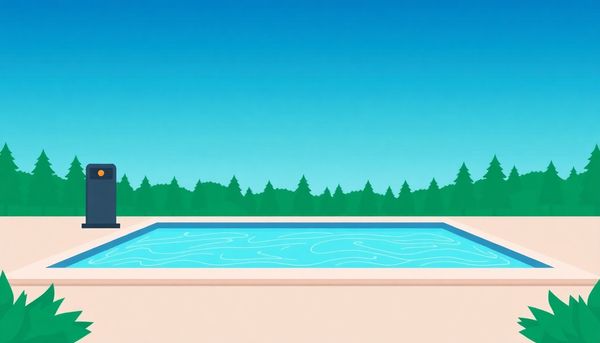
Selecting a pool heater involves more than merely picking the first one that catches your eye; it's about understanding your options and how they align with your specific needs. Three primary fuel types dominate the market: gas, electric heat pumps, and solar heaters, each with distinct advantages and considerations.
Gas heaters, powered by natural gas or propane, provide quick and efficient heating, ideal for those brisk, chilly mornings. However, while they boast rapid heating, they come with higher operational costs, particularly if propane is your chosen fuel. In colder climates, their reliability shines, offering consistent warmth even when temperatures plummet.
Electric heat pumps, on the other hand, thrive in milder climates. They utilize ambient air to heat the pool, making them a cost-effective and eco-friendly option over time, despite their higher upfront costs. Their efficiency can be hampered in colder weather, so consider your local climate before investing.
Solar heaters are the green champions of pool heating. They rely on the sun’s energy, making them virtually cost-free to operate once installed. Best suited for sunny regions, they might struggle in areas with less consistent sunshine. Installation costs can be significant, and you’ll need ample space for solar panels, but their long-term savings are hard to ignore.
Consider your budget, environmental concerns, and local climate when comparing these options. The right heater not only enhances your swimming experience but also aligns with your lifestyle and environmental values.
Understanding the efficiency of a pool heater can make a world of difference in both your swimming comfort and your utility bills. When I was choosing a pool heater for my backyard oasis, I realized that efficiency isn't just about getting the water warm; it's about doing so without breaking the bank. The first thing to consider is the type of heater you choose. Gas heaters, for instance, heat up quickly and are perfect for those spontaneous chilly morning swims. However, if you plan to keep your pool toasty throughout the season, an electric heat pump might be more cost-effective because it utilizes ambient air to warm the water.
One enlightening detail I uncovered is the significance of BTU ratings, a measure of heater output. A higher BTU ensures faster heating, but it can also mean higher fuel consumption. In my case, opting for a mid-range BTU suited my moderately sized pool and temperate climate, striking the perfect balance between performance and cost. Also, don't forget about maintenance and installation costs; a well-installed and maintained heater runs more efficiently. Whether you're a weekend swimmer or a year-round enthusiast, understanding these efficiency aspects can save you a lot of hassle and money down the line.
Lastly, always keep local climate and pool usage habits in mind. An efficient heater tailored to your specific needs makes the investment worthwhile, allowing you to enjoy your pool no matter the season.
Imagine selecting the perfect pool heater, only to find it underperforms because you overlooked the climate's influence. Understanding your local climate is crucial when choosing the best pool heater. For those basking in mild, sun-drenched regions, a solar heater might be the ideal choice. Its ability to harness abundant sunlight can keep your pool warm while saving on energy costs. However, in areas where sunlight is a rare commodity during certain seasons, relying solely on solar might leave you shivering.
In contrast, if your home is nestled in cooler climates where temperatures frequently dip, a gas heater might be your best ally. It offers rapid heating, ensuring your pool is ready when you are, even on those brisk mornings. My cousin in Minnesota swears by her gas heater, which transforms her pool from icy to inviting in under an hour, providing an extended swimming season even as chilly winds begin to blow.
Consider electric heat pumps for a middle ground—they're efficient but lose efficacy as temperatures fall below 50°F (10°C). A friend in Georgia finds this a perfect match for mild winters, maintaining pool warmth with minimal running costs. Remember, the local climate not only dictates the type of heater but can significantly impact your utility bills and overall pool enjoyment. Choose wisely, and let your region guide you to the most efficient and cost-effective solution.
When considering a pool heater purchase, it's crucial to weigh the cost-benefit options carefully. Pool heaters, like any significant investment, come in various shapes, sizes, and technological capabilities. Each type—be it solar, gas, or electric heat pumps—offers distinct financial implications both upfront and over time. Solar heaters, for instance, shine brightly in the realm of energy efficiency, harnessing the sun’s power to warm your water. They may require a larger initial layout for installation, particularly with the need for ample roof or yard space for panels, but they can significantly cut down on monthly bills. Think of it as a long-term savings bond rather than a quick cash win.
Gas heaters, on the other hand, are the sprinters of the heating world. They heat your pool quickly, making them ideal for those spontaneous chilly nights when you decide a quick dip is just what you need. However, rapid heating comes at a price, with operating costs potentially running high, especially if propane is your fuel of choice.
Electric heat pumps lie somewhere in the middle, boasting a balance between efficiency and speed. They are particularly appealing in milder climates, where they can maintain a consistent temperature without breaking the bank. However, they can be less effective in colder environments.
Ultimately, choosing the right pool heater requires a careful analysis of your personal priorities—do you value upfront savings, long-term efficiency, or rapid temperature control? Each choice has its trade-offs, but informed decisions will ensure you’re lounging comfortably without regret.
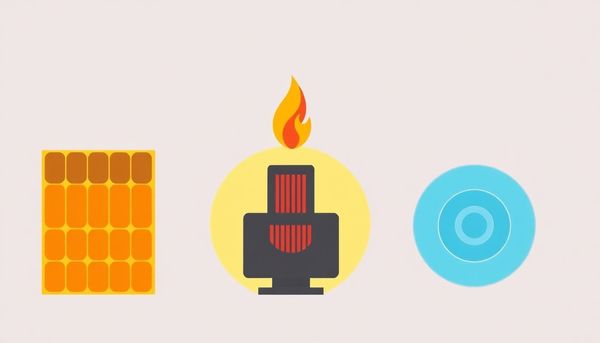
Exploring the world of pool heaters, one quickly realizes that energy efficiency isn't just a bonus—it's a necessity. Pool heating can be an energy-intensive endeavor, but modern technology offers a variety of features designed to keep your utility bills in check while maintaining a comfortable swimming environment. These energy-saving features are like having a friend who knows how to stretch a dollar without skimping on comfort.
Take, for instance, the heat pump. This option relies on ambient air to generate heat for your pool, operating efficiently even when the air temperature dips slightly. While they might require a little more investment upfront compared to traditional gas heaters, their long-term savings make them appealing. They convert every unit of electricity consumed into up to five units of heat, effectively multiplying your energy input. In warmer climates, these pumps shine, quietly maintaining pool warmth without the need for fossil fuels.
Solar collectors are another star player in the energy-saving arena. Utilizing the sun's free power, they can raise water temperature significantly, given ample sunlight and installation space. These systems often pair well with solar covers, which help trap heat and reduce evaporation when the pool isn’t in use. Think of it as putting a cozy blanket over your pool, conserving warmth through cool nights.
Low NOx gas heaters, while traditional, have evolved with advanced combustion technology, reducing emissions and improving efficiency. They’re well-suited for quick heating needs or locations with cooler climates, balancing speed with eco-friendly operations.
By carefully considering these features, you can select a pool heater that not only extends your swim season but also respects both the environment and your budget.
Selecting the ideal pool heater is akin to finding the right key for a lock—once you have it, everything falls into place effortlessly. The choices often boil down to three main types: solar, gas, and heat pump heaters. Each has its own strengths and trade-offs, and your decision should align with your climate, budget, and swimming habits.
Start by considering your local climate. If you live in a sun-soaked region, a solar heater could be a savvy, eco-friendly choice. They harness the sun’s rays to warm your pool, though they require a substantial surface area, often equal to or more than your pool’s footprint, for optimal effectiveness. This might mean expanding onto your roof or dedicating significant yard space.
For those in cooler climates or seeking rapid heating, gas heaters provide a robust solution. They deliver swift temperature increases and are not weather-dependent, making them perfect for last-minute swim plans. However, they come with a higher operational cost, especially if you opt for propane over natural gas. It’s vital to factor in both installation and fuel costs.
Heat pumps present a middle ground, leveraging ambient air to heat your pool efficiently, albeit at a slower pace. They are best suited for moderate climates and can be paired with solar covers to maintain warmth, thus reducing energy expenses.
Ultimately, your pool size, desired swimming season length, and environmental considerations should all guide your decision. With the right heater, you’ll transform chilly waters into a year-round oasis, ensuring every dip is as delightful as the last.
Envision stepping into a pool powered by the warmth of the sun or the gentle hum of an electric motor, keeping your dip eco-friendly and inviting. In today's world, being both green and cost-efficient has never been more appealing, especially when considering options to heat your swimming pool.
Start by exploring solar pool heaters, a popular and sustainable choice. These systems harness solar energy using panels that can be mounted on your roof or laid out in your yard. For instance, a setup of 80 square feet of solar panels can effectively raise your pool's temperature by 6°F to 10°F. While the initial investment ranges between $3,000 and $4,000, the savings on operational costs will quickly add up, making it an appealing long-term solution.
On the other hand, electric heat pumps offer an excellent balance between greener energy use and reliability. These pumps work by drawing in ambient air, warming it, and transferring that heat to your pool water. They are particularly effective in moderate climates and can be more affordable to operate compared to gas heaters. While they may cost more upfront, ranging from $2,000 to $5,000, their durability and efficiency make them a worthy investment.
Both solar and electric options are complemented by using a solar cover, which acts like a thermal blanket, trapping heat and minimizing water evaporation. This simple addition can save you substantial heating costs while keeping your pool ready for a swim. Exploring these eco-friendly options not only benefits the environment but also enhances your swimming experience with sustainable comfort.
When it comes to pool heating, efficiency is the name of the game. Often overlooked, optimizing your pool heater can save substantial energy and cost, while ensuring your swim remains comfortably warm. For instance, investing in a solar cover is akin to wrapping a cozy blanket around your water oasis. During sunny days, it captures heat, raising the temperature by up to 10°F. At night, it minimizes heat loss and evaporation, much like the lid on a steaming mug of coffee.
Consider the placement and usage of your pool heater. Electric heat pumps, for example, thrive in milder climates. These devices draw ambient heat from the air, so orienting them in a sunny, open space maximizes their efficiency. A family in Florida might find their electricity bill far more forgiving than one facing chilly northern winds, all thanks to strategic placement and usage.
Routine maintenance is another key factor. Regularly check your pool’s pH levels; imbalances can erode even the sturdiest heaters, leading to inefficient energy use. My neighbor learned this the hard way, watching her energy bill climb as her heater struggled against corroded elements. With proper care, your heating system can run smoothly and efficiently, ensuring that every swim is just right.
Incorporating these practices not only extends the life of your heater but also ensures you're swimming in comfort without breaking the bank. Optimize today, and splash happily tomorrow.
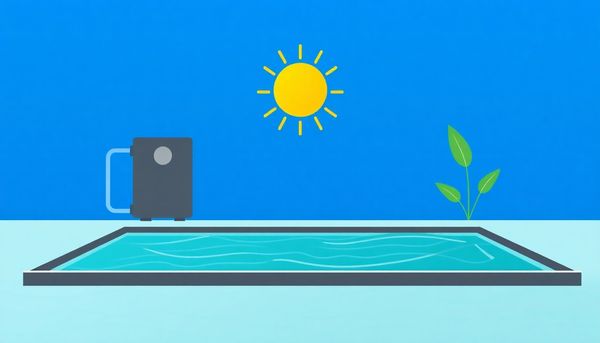
Finding the right heater size for your pool is akin to fitting the perfect puzzle piece into a complex jigsaw. It’s not just about getting the biggest or the most expensive unit; it's about precision and understanding. Every pool has its unique characteristics, from size and depth to location and climate, and these all influence the heater's performance.
Consider this: a pool in sunny Florida needs a different size heater compared to one in chilly Massachusetts. The formula for determining heater size begins with your pool’s surface area in square feet. Multiply this by the desired temperature increase (the difference between the ambient air temperature and your preferred pool temperature), and then multiply again by 12—a standard factor used in thermal calculations. This will give you the total BTU (British Thermal Units) required. For instance, if your pool’s surface area is 500 square feet and you wish to raise the water temperature by 15 degrees Fahrenheit, you’ll need a heater that can produce at least 90,000 BTUs.
However, BTU isn't the sole consideration. The efficiency of your chosen heater type—whether gas, electric, or solar—also plays a crucial role. Solar heaters operate optimally in sunny regions, while gas heaters offer rapid heating for cooler climates. Personal experiences highlight that misjudging the heater size can lead to increased costs and inefficient heating. Thus, matching the heater to your specific pool conditions can save money and energy in the long run, ensuring your aquatic oasis is always ready for a dip.
When considering a pool heater purchase in 2024, exploring various options is much like selecting the perfect playlist for a summer afternoon—each type offers its own unique rhythm that can enhance your swimming experience. Heat pumps, gas heaters, and solar heaters represent the trio of choices, each with distinct benefits and considerations.
Heat pumps are akin to the reliable tracks that play on repeat; they’re energy-efficient and perform well in warmer climates. By drawing warmth from the outside air, they offer a consistent heating experience with lower operational costs. However, if you live in a cooler region, they may not be as effective when the temperature dips below 60°F (15.5°C).
Gas heaters, in contrast, deliver an upbeat tempo with their rapid heating capabilities. Ideal for those living in cooler climates, these heaters use natural gas or propane to swiftly raise water temperatures, allowing you to make the most of crisp mornings and chilly evenings. Yet, their tune comes with a cost—higher operational expenses and a more significant environmental footprint.
Solar heaters, the eco-friendly ballads of the group, harness the sun’s energy to gently warm your pool. With minimal operating costs, they are perfect for those with ample sunlight and a knack for sustainability. Nonetheless, they rely heavily on consistent sunny weather conditions, which can sometimes dim their performance.
Evaluating these options involves more than just technical specs; it’s about aligning your choice with your lifestyle, location, and budget to ensure your poolside retreats hit all the right notes.
When it comes to maximizing the efficiency of your pool heater, a strategic approach can significantly cut down energy costs and extend your swimming season. Start by choosing the right heater for your climate and pool usage. In warmer regions, where temperatures rarely dip below 60º F, an electric heat pump paired with a solar cover can be a budget-friendly solution, providing consistent warmth without the hefty gas bills. Meanwhile, for those inhabiting chillier climates, a gas heater might be the necessary ally, offering rapid heating even in brisk weather conditions.
Next, consider your pool's specific needs. A digital pool thermometer can be a game-changer. By closely monitoring the water temperature, you can ensure the heater is used only when necessary, optimizing both energy usage and comfort. Additionally, employing a solar or liquid solar cover when the pool is not in use helps to trap heat, reducing the workload on your heater. Think of it as wrapping a blanket around your pool, keeping it cozy and warm overnight.
Lastly, routine maintenance is crucial. Regularly check for leaks, debris, and scale buildup within your heater. This ensures the system runs smoothly, avoiding unnecessary energy waste. By nurturing your pool heater with these practices, you not only enhance its efficiency but also prolong its lifespan, securing many years of blissful swimming.
Choosing the ideal heat source for your pool heater can feel like a daunting task, but think of it like crafting the perfect recipe for warmth. Each type of heater brings its own unique flavor to the table, and selecting the right one depends on your specific needs and circumstances. Let’s explore the main contenders: gas heaters, heat pumps, and solar heaters.
Gas heaters are the speed demons of the pool heating world. They run on natural gas or propane and are perfect for those chilly evenings when you want to jump into a warm pool post-haste. However, they can be pricier to operate, especially if propane is the fuel of choice, so keep an eye on those monthly bills.
Heat pumps, on the other hand, are like the slow-cooked meal of pool heating. They draw air from the environment, transforming it into heat that gradually warms your pool. While the initial cost can be higher, their efficiency in mild climates makes them a long-term economical choice. Plus, pairing them with a solar cover can significantly reduce energy expenses.
Solar heaters harness the sun’s energy, making them an environmentally friendly option. They’re ideal for sun-drenched regions and offer minimal operational costs after installation. But remember, their effectiveness is directly linked to the availability of sunlight, making them less reliable during overcast or cooler seasons.
Ultimately, your decision should balance your budget, environmental considerations, and how quickly you want your pool to warm up. Each option has its charms, so choosing wisely will ensure your pool remains a welcoming oasis throughout the seasons.

When a pool heater arrives at your doorstep, not only have you taken a crucial step toward warmer waters, but you're also about to embark on an installation adventure. First, consider positioning. Whether you opt for a gas, solar, or electric heater, placement matters. Solar panels belong where the sun generously graces your space—typically, a roof or a sun-drenched area of the yard. Gas heaters need proximity to both the pool and a gas line, while electric units require a strategic spot away from potential water exposure, yet close enough for efficient heating.
Next, think about the plumbing aspect. If you're replacing an old heater, you might be tempted to reuse the existing plumbing. However, it's often wise to inspect and potentially upgrade your setup to improve efficiency. My neighbor once discovered a mismatched pipe size when swapping out their heater. It set them back a few days, but ensuring the right fit from the start can save time and hassle.
Electrical connections demand attention as well. An electrician can guarantee safe connections, preventing future headaches. Finally, adjust your expectations based on climate. In cooler climates, supplementing your installation with a solar cover can optimize heating efficiency, keeping those precious degrees intact overnight. Embrace these installation tips, and your pool will be the envy of the neighborhood, inviting warm, leisurely swims even when the thermometer dips.
Choosing the right pool heater can feel like navigating a maze, but it doesn't have to be daunting. Consider it as matching the perfect accessory to your favorite outfit—it should complement your pool's needs and your lifestyle. Start by understanding the climate where you live; this is the compass guiding your decision. If chilly winters give you pause, a gas heater might be your best friend. Quick to warm and resilient in colder temperatures, it keeps your pool inviting even when the air isn't.
For those basking in sunlit locales, solar heaters offer an eco-friendly and cost-effective solution. They harness the abundant sunshine to keep your pool at the perfect temperature. Remember, though, that they do require ample space for solar collectors, either on the roof or in your yard. Consider your home's layout and the amount of sunshine your area enjoys before making the leap.
If you find yourself in a moderate climate, electric heat pumps bridge the gap between gas and solar options. They draw warmth from the air, making them efficient and sustainable choices for many. Keep in mind they perform best when the air temperature is above 60ºF (15.5ºC), so if your area frequently dips below this, you might reconsider.
Ultimately, your pool heater should align with your seasonal goals, budget, and environmental stance. Take the time to weigh the initial investment against long-term savings, and you'll find a heater that transforms your pool into a year-round oasis.
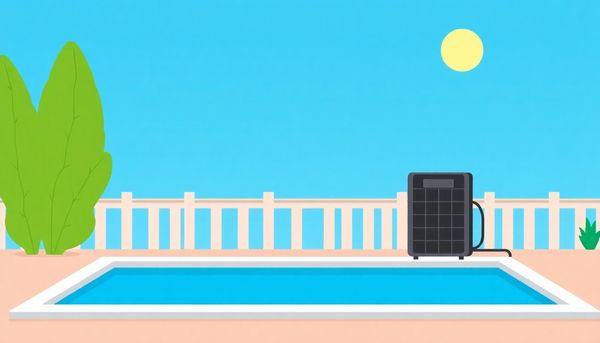
This article provided insights into maintaining your pool. Start your pool care journey today!
Want to become a pool maintenance expert? Our free Pool School course covers everything you need to know about pool care. From basic maintenance to advanced troubleshooting, you'll learn how to:
Join over 10,000 pool owners who have already transformed their pool care routine. Get started with our free Pool School course today!